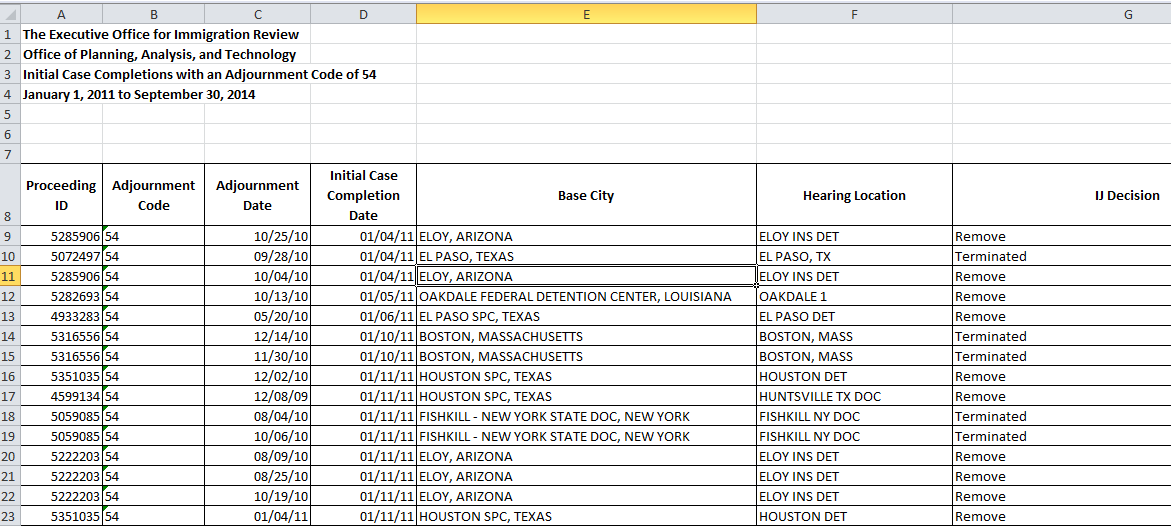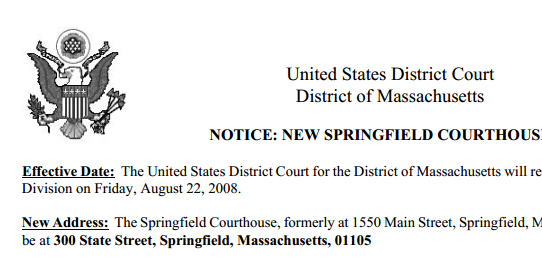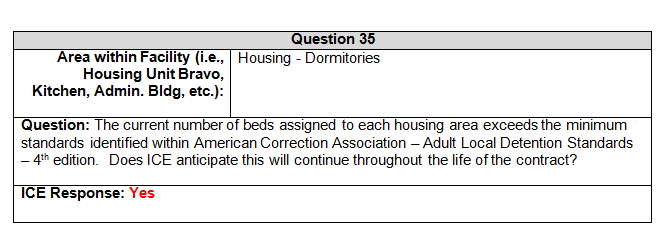click to enlarge
Data recently released by the Executive Office of Immigration Review (EOIR) responsive to my FOIA request shows ICE today still is holding US citizens from days to years prior to their cases being terminated or closed.
JUNE 1, 2015 UPDATE--Following more detailed screens for duplicates and analysis of outcomes other than terminations or removals, a final analysis has been produced. Please see here for final results and dataset. Also, Andre Joseph, to obtain his liberty from the McHenry County Jail, decided to accept an order deporting to Jamaica. We are still awaiting the release of his full military file for evidence to corroborate his narrative of being naturalized in the time frame of his recruitment by the U.S. Navy in Springfield, Massachusetts.
ICE Use of Fraudulent Data Violates Due Process
Andre Joseph has been in ICE custody in Chicago since September 9, 2014. Joseph himself had been deported and, back in the U.S., was trying to obtain paperwork from his 1984 naturalization.
Joseph is concerned about the fact that after he was arrested ICE agents ignored his requests for an N-600 form (so he could obtain his already existing Certificate of Citizenship) and then, after he obtained one, failed to help him procure the passport photos necessary for its submission.
According to Joseph, when he was 18 he went to the federal building in downtown Springfield, Massachusetts to take the test for joining the Navy. His recruitment officer told him to go upstairs and naturalize. Joseph says he passed the test and was sworn in as a US citizen, but was so anxious to cram for the military exam that he dashed back downstairs before picking up the certificate.
The regulation on citizenship states that the effective date of naturalization is the day one is sworn in (8 CFR 1337.9). Joseph says he surrendered his green card and did everything he was supposed to do, and that the folks in the military office congratulated him on his citizenship and made positions available to him in the Navy that would not be available if he had not become a citizen.
Consistent with Joseph's account is that there is indeed a federal building on Main Street (1550) in Springfield, just as Joseph testified last week at his hearing before adjudicator Richard Fujimoto,
Further confirmation is that the same building housed a US Navy Recruiting office,
AND, still has DHS offices,
,
(RAC = Resident Agent-in-Charge)
According to Northwestern student Hayley Hopkins, who observed the televideo hearing last week in downtown Chicago, the government trial attorneys tried discredting Joseph by claiming that in this time frame, he would have needed a judge to perform the ceremony.
Maybe, maybe not. Either way, the ICE attorneys never informed adjudicator Fujimoto that until 2008, the federal building at 1550 Main Street, Springfield also housed the U.S. District Court of Western Massachusetts.
Joseph's narrative suggested the recruiters there routinely were naturalizing the new recruits and it is plausible they had an arrangement with the federal judges to facilitate this in an expeditious fashion, i.e., that day. (It also could have been coordinated through a Massachusetts program also housed in the building, which focused on attracting and supporting immigrants in the region.)
Also consistent with Joseph's narrative of effecting his naturalization in 1984 is the E-Verify print-out Joseph's wife brought with her to the hearing last week. (She runs a small business and in 2012 used the interface to inquire into her husband's status.)

click to enlarge
Hopkins told me she was shocked that the DHS attorneys, and also adjudicator Fujimoto, appeared to have no familiarity at all with E-Verify, which since 2008 has been using social security cards tied into Citizenship and Immigration Services databases that automatically update citizenship status after naturalization. (This recalls retired adjudicator Jimmie Benton's observation about the poor training EOIR provides its adjudicators.)
click to enlarge
The trial attorneys claimed to have exhaustively researched the case, but failed to mention any of the information above.
ICE public affairs director for the Central Region, Carl Rusnok, has ignored repeated inquiries by phone and e-mail. (Typically they respond that they cannot comment on cases for privacy reasons, but since I attached Joseph's privacy waiver they just ignored the queries altogether.)
ICE Agent Obstruction of Justice and RICO Violations
At this point it is impossible to say whether the database will back up Joseph's narrative. But it's also impossible to say if this is because Joseph is confused or because DHS components are altering or destroying records, as ICE agents demonstrably did when they reported the circumstances of Joseph's arrest.
This is a very serious problem. The main evidence of citizenship and many other immigration claims lies in government maintained records. If the government is manufacturing or hiding its own records, as it has clearly done with Joseph's arrest report, then we will never know what happened with Joseph in Springfield, Massachusetts in 1984.
"They're playing a game and they're not
being truthful. They're lying now like they were lying back then," he said, referring to when an INS agent in 2002 told him that his bank robbery conviction meant his citizenship was being revoked.
ICE agents arrested Joseph at the Infopass appointment. But the arrest report claimed he was arrested at his residence.
click to enlarge
101 W. Congress Parkway is the address for the Citizenship and Immigration Services, and also the detained immigration courts.
Joseph resides in Waukegan, not a federal building. The ICE officers who arrested him knew this; they had his driver's license. And they knew this from his wife, who thought she was just dropping him off for a little administrative appointment, and was out doing a little shopping in the Loop.
Another problem is that the summary of the ICE arrest reports states that Joseph had not filed a petition for his naturalization, even though he claimed otherwise and was in line to follow up on that.
click to enlarge
Joseph told the agents he had been sworn in as a US citizen in 1984, implying he had petitioned for this at that time. And the only reason he didn't file a petition on September 9, 2014 is that ICE arrested him.
Of course it is possible Joseph is confused or himself obfuscating. But why not point this out, rather than obscure the true location of his arrest and the underlying events surrounding it? And, after he's locked up, why prevent him from filing an N-600 form?
In immigration court last week, when Joseph over the televideo from McHenry County Jail expressed concerns about the false statements and his wife, present in the court, showed adjudicator Fujimoto the entire print-out from ICE's system records, the ICE trial attorneys responded in an accusatory tone, "Where'd you get that?!" implying that by procuring his own records he had violated a government secrecy act.
It is troubling that the ICE attorneys and the adjudicator paid zero attention to the clearly false information in their own records. At the end of the day, the records Joseph has produced are consistent with his claims of US citizenship and the ICE records are evidence of obstruction of justice. (18 USC 1519: "Whoever knowingly alters, destroys, mutilates, conceals, covers up, falsifies, or makes a false entry in any record, document, or tangible object with the intent to impede, obstruct, or influence the investigation or proper administration of any matter within the jurisdiction of any department or agency of the United States or any case filed under title 11, or in relation to or contemplation of any such matter or case, shall be fined under this title, imprisoned not more than 20 years, or both.")
Joseph Needs a Lawyer
Joseph wrote a very clear narrative of events that he submitted to adjudicator Fujimoto, along with the 2012 E-verify printout, but he, his wife, and also the student observer Hayley Hopkins, were shaken by Fujimoto's indifference and the government's double-standards. "They only respect a lawyer," Joseph told me. Hayley reported that Andre and his wife said that the I-213 summary "showed evidence of misrepresentation," but that instead of taking it seriously, the government attorneys were "skeptical of how they got this, and asked, 'How were you able to obtain ICE documents?'"
These events are just a piece of the larger problem with deportation proceedings today. If either President Obama or Congress really care about the rule of law, then they should stop arguing about prosecutorial discretion and put ICE on ICE and stop deportations until everyone has an assigned attorney and there are regulations for detention centers, absent which people are agreeing to being deported to effectively escape conditions of torture.
I am not claiming that most people in deportation proceedings have secured the proper permissions to remain in the United States or have not violated laws consistent with the government's prerogative to deport them. I am claiming that virtually all proceedings reveal the government to be breaking laws that are much more important to public safety than the ones those in their custody are accused of violating.
Coda
Finally, we should all be praying over Franz Kafka's grave, his body surely tossing like mad by now. His name frequently appears in federal court decisions responsive to BIA and IJ orders,mostly because of their failures of logic and legal inventiveness -- my favorite is the BIA precedent based on an invented portion of the Mexican Constitution. In the event, the specific problem Kafka highlights is the blurring of private and public behaviors in spaces that are putatively governmental. On the one hand, the citizen goes before the law expecting from the court fairness and knowledge of the law, and then is frustrated by officials who are much less orderly and civic minded than their supplicants, which Kafka dramatizes by the family and dining scenes inside the court building.
All this is weirdly brought to life by the recent published and leaked reports by the DOJ OIG and DHS OIG, respectively. The image of our immigration and deportation business being treated with all the graveman of the family chores is, alas, the horror Joseph now confronts.




















